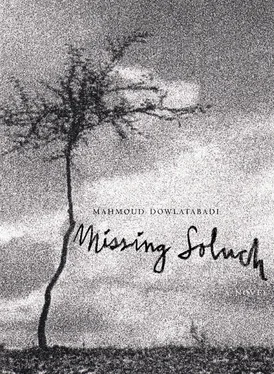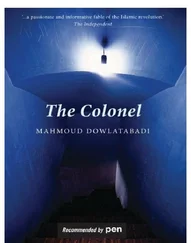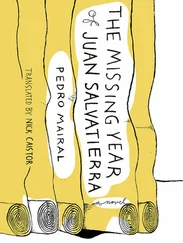Salar said, “Be ready and on the road at the break of dawn. Did you settle your accounts with Ali Genav yet?”
Abrau said, “I didn’t really have any accounts with him.”
Salar looked at his partners and said acidly, “They call minding the bath a job? Anyway … the weather’s getting warm. No one will be using the baths for another six or seven months. Anyone can just go down to the stream and wash there.”
Kadkhoda Norouz returned. Mergan and Hajer were with him. It seemed she had finished her work; the sack with her tools was on Hajer’s back. As she passed by the men, she said to Zabihollah, “You can give Abrau what you owe me for the whitewashing of your house to bring with himself!”
Mirza looked at the Kadkhoda, who shook his head.
“No … she won’t reconsider!”
Mirza rose from the bench. “I’ll make her reconsider! You, boy, go tell Abbas to come to Zabihollah’s house tonight. We need to discuss something with him!”
Abrau said, “Okay.”
Mirza, Zabihollah, and Salar Abdullah left as Abrau stood watching them. Haj Salem and Moslem came out from behind a wall and set out following the partners. The Kadkhoda walked out as well, but before he shut the gate he looked at Abrau.
“Your mother is truly impossible, you know?”
Abbas felt rejuvenated as he left Zabihollah’s house. He felt satisfaction mixed with anxiety. The fatigue had left his body, or was lost inside his body. He grasped the bills of money he had received from Mirza Hassan, knowing just what he intended to do with them. He didn’t want to keep them at hand nearby. He never wanted his money to be in eyeshot. He never wished for his affairs to be out in the open. There was always subterfuge to his plans. He always wanted things to be partially hidden, especially his winnings or losses in gambling. If not all of it, at least a few qerans of money. He loved to keep secrets. Even if the secret was meaningless. The feeling of insecurity and his lack of trust in others had taken such a root in him that he sometimes tried to keep hidden the most obvious of things. Most of his lies were exposed in the light of day, but he didn’t care if others thought of him as a liar, or called him one. What was important to him was that others not know what he was really up to. Put simply, Abbas didn’t want anyone to know what he was doing with even a single qeran of his money, or where he had stashed it. Of course, this inclination was not particular to Abbas but is shared by many others in similar circumstances.
Abbas’ present problem was to figure out how he could cut short the inevitable argument he would have with his mother. He wanted to think of a way to keep a hold of half of the money and to avoid a fight by giving half of it to her for the house. He had just decided to look for a place to hide the other half that he would keep. He entered a deserted and ruined home and undid the tie on his pants. The hem of his pants was the safest spot on him. Shortly, he returned to the alley and tightened the tie on his pants. Now only two bills remained in his hand from what he’d been paid for his portion of the family’s plot in God’s Land. He had just handed over two dang of the six dang that had been Soluch’s plot.
In the alley he encountered Ali Genav’s wife, who was creeping along like a shadow in the dark. She moved very slowly, holding onto the wall with one hand and grasping her walking stick with the other. Her soft moaning sounded like the flutter of a moth’s wings. Abbas was saved from himself for a moment — Raghiyeh distracted him from the troubled thoughts filling his mind.
Although Raghiyeh had spent a few mornings in a town hospital, there was no sign of improvement in her. Day by day, this broken woman deteriorated. It was as if she was melting, as if her bones were shrinking and the skin on her face was drying. She didn’t have the energy to speak for long, and her legs couldn’t even transport her skin and bones from one place to another.
Abbas approached her and with a loud voice — as if she had gone deaf — he said, “How are you doing? How are things?”
Raghiyeh leaned against the wall and caught her breath. It was as if she could die at any moment. Leaning on the wall, she slid into a seated position and stayed grasping the walking stick with both hands like a pillar. She sighed sadly. It was an effort for her to make any sound, and she could barely raise her voice to be heard by Abbas. She sounded very far away. It was as if she were speaking from behind hills of gravel, or from the center of a furious tempest. She no longer had the sound of a woman, a human. She sounded like a lamb that had strayed from the herd and had been caught in a wasteland alone. It was the sound of exhaustion, thirst, of the sadness of a life in the desert, near death. The sound was not the sound of Raghiyeh but the soft murmur of dry wheat in the wind. It was as if a thorny handful of barley were blocking her throat. The sound seemed to rise from beneath the earth, as if Raghiyeh had already died.
“No. I’m dying. I’m dying. I was going … I was going to go to your house … your house …”
“Yes?”
“I was going … to tell your mother … Oh God …! My breath … why can’t … I catch my breath?”
“Yes? To tell her what?”
“To tell her … that … that … she could have waited … at least until … I died before …”
“Before what?”
“Before … before giving … her daughter … to my husband … but … but … I turned back … I didn’t tell her … because … I realized … What good …? What good would it be?”
Raghiyeh leaned her head against the walking stick. She waited for a moment and then tried to lift herself up with all of her strength. But she couldn’t, and she sat down again. Abbas grabbed her under the arm and helped her up. She stood and leaned against the wall with one hand. She caught her breath and then slowly began walking. She went slowly and calmly, like a turtle, only slower. Abbas thought to himself, “It will take her all night just to go the short distance back to her home. What if she dies on the way?” He heard her voice.
“It’s not right … Oh God …! I pray on Zaynab’s misery … I pray on Zaynab’s sacrifice … Just don’t let this happen …”
The sound of her voice was swallowed in the turns of the alley, and Abbas headed back to his home, walking more slowly than before.
On this night, the house had a strange atmosphere. There were no visitors to their home, but inside it seemed more alive than usual. Everyone in the house had broken the humdrum continuity of their nightly routines, and their actions had a new hue and color to them. It was like when the autumn morning light shines on the wheat harvest; the old dry husks that contained them had begun to open and fall away, letting them flutter individually in the way that was their nature. They blew in the wind, this way and that. Some even took to the wind, flying. Each had its own reason for joyfulness. In the midst of this, although he tried not to show it, Ali Genav was the happiest of all, while Mergan was also happy, in her own way. Her life had been shaken; the wedding of a daughter is always a point of pride for a mother, and seen from her perspective, Mergan was satisfied. Even Hajer was now more or less satisfied, because she was slowly approaching that stage that customarily most girls, more or less, anticipate: marriage.
Hajer had brought herself to believe that most marriages are only slightly desirable but become more acceptable with a bit of imagination. It’s a human affair, after all! One can quite often just choose to overlook certain things. Like the fact that Hajer wasn’t yet thirteen, or the fact that Ali Genav’s beard was turning gray. And most of all, the fact that she was marrying a man who not only still smelled of his first wife, but who also lived with her. Also, this wife lived her life as a ghost, pacing around their little house with a cane. Raghiyeh … a woman transformed into anger and complaints, whose voice seemed to emanate from the mud-brick walls. She was a woman with eyes that watch the world from behind an inner curtain. Eyes covered by dust, tinted with the color of sleep, which watch you from the depths of their sockets. They keep looking at you and ask you something silently. They only say one thing; something wordless, something impossible to express. A thousand words could be said, but that one last one would be left unsaid, a word that keeps on bothering you. But it’s a human affair, after all. Some things can just be overlooked. No doubt, Hajer would have to overlook many things.
Читать дальше












